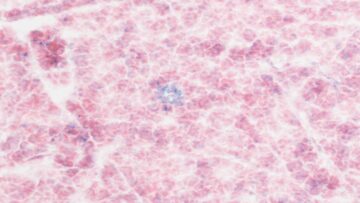Shelly Fan in Singularity Hub:
 A preventative anti-aging therapy seems like wishful thinking. Yet a new study led by Dr. Corina Amor Vegas at Cold Spring Harbor Laboratory describes a treatment that brings the dream to life—at least for mice. Given a single injection in young adulthood, they aged more slowly compared to their peers. By the equivalent of roughly 65 years of age in humans, the mice were slimmer, could better regulate blood sugar and insulin levels, and had lower inflammation and a more youthful metabolic profile. They even kept up their love for running, whereas untreated seniors turned into couch potatoes. The shot is made up of CAR (chimeric antigen receptor) T cells. These cells are genetically engineered from the body’s T cells—a type of immune cell adept at hunting down particular targets in the body.
A preventative anti-aging therapy seems like wishful thinking. Yet a new study led by Dr. Corina Amor Vegas at Cold Spring Harbor Laboratory describes a treatment that brings the dream to life—at least for mice. Given a single injection in young adulthood, they aged more slowly compared to their peers. By the equivalent of roughly 65 years of age in humans, the mice were slimmer, could better regulate blood sugar and insulin levels, and had lower inflammation and a more youthful metabolic profile. They even kept up their love for running, whereas untreated seniors turned into couch potatoes. The shot is made up of CAR (chimeric antigen receptor) T cells. These cells are genetically engineered from the body’s T cells—a type of immune cell adept at hunting down particular targets in the body.
CAR T cells first shot to fame as a revolutionary therapy for previously untreatable blood cancers. They’re now close to tackling other medical problems, such as autoimmune disorders, asthma, liver and kidney diseases, and even HIV.
The new study took a page out of CAR T’s cancer-fighting playbook. But instead of targeting cancer cells, they engineered them to hunt down and destroy senescent cells, a type of cell linked to age-related health problems. Often dubbed “zombie cells,” they accumulate with age and pump out a toxic chemical brew that damages surrounding tissues. Zombie cells have been in the crosshairs of longevity researchers and investors alike. Drugs that destroy the cells called senolytics are now a multi-billion-dollar industry. The new treatment, called senolytic CAR T, also turned back the clock when given to elderly mice.
More here.
